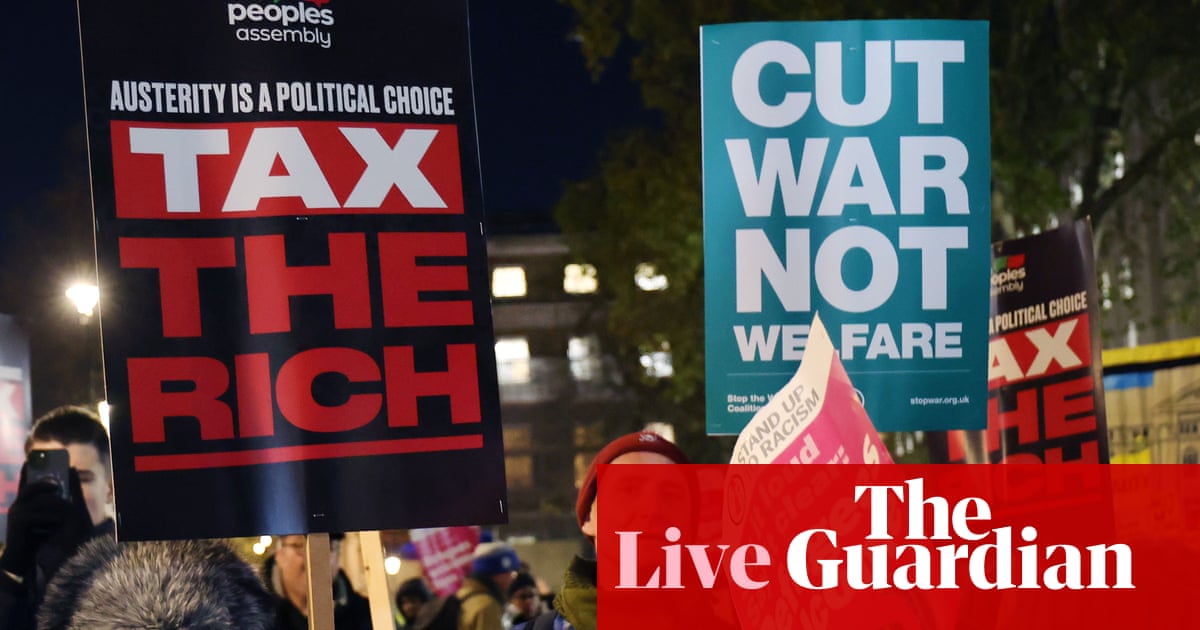Goldman Sachs predicts £30bn of tax rises
Goldman Sachs have predicted that Rachel Reeves will increase her budget headroom to £15bn, from £10bn in the last budget, mainly through higher taxes.
Reminder, this is the flexibility to hit government’s first fiscal rule, to be on track to achieve a current budget surplus, where day-to-day spending is less than total revenues in 2029–30.
Goldman economist James Moberly predicted last week that the government heads into the budget with a £20bn deterioration in its headroom against the deficit rule (due to the expected downgrade of Britain’s economic prospects by the OBR, higher debt costs, and the reversal of planned welfare cuts).
In addition, potential measures such as freezing fuel duty (again) and lifting the child benefit cap (finally) would cost £8bn.
In that scenario, a gross consolidation of around £33bn would be needed to grow the headroom to £15bn.
Moberly explains:
We expect only modest spending cuts of around £3bn, implying that around £30bn of tax increases are likely required.
After the government reportedly reversed plans to raise income tax rates, an extension of threshold freezes combined with a series of smaller measures now looks the most likely avenue to raise revenues.
Introduction: Will tax-heavy budget reassure bond markets?
Good morning, and welcome to our rolling coverage of business, the financial markets and the world economy.
“You can please some of the people all of the time, you can please all of the people some of the time, but you can’t please all of the people all of the time,” as the old quote has it.
And today, chancellor Rachel Reeves faces the challenging task of pleasing (or at least not displeasing too badly) four different constituencies – Labour MPs, voters, businesses, and the bond market – with her budget announcement, which is likely to be heavy on taxes.
Reeves faces a tough task, given the £9.9bn headroom to keep within her fiscal rules has been eroded by higher borrowing costs, and welfare U-turns.
A downgraded OBR productivity forecast expected today adds to the chancellor’s challenge of remaining on track for the current budget to be in balance in 2029-30 (the government’s fiscal mandate).
Ideally, Reeves would like to end up with more headroom than before, to protect the UK against volatile government bond markets.
Investors will be watching closely to see how (and indeed if) she achieves this.
One option is to spend less. Labour MPs, though, are opposed to spending cuts, as shown by the revolt against the government’s welfare reforms.
Reeves tried to sweeten her party earlier this week, telling them the budget would include some measures they’ll like, and calling it “a package not a pick and mix … you can’t say I like the cola bottles but not the fruit salad”.
Potential tasty ‘cola bottle’ measures are the end of the two-child benefit cap, to fight poverty, and help on energy bills, to battle the cost of living squeeze.
Raising taxes is another lever, but Reeves appears to have lost her appetite for a manifesto-breaking rise in income tax. That means we may get a ‘smorgasbord’ of smaller tax rises, including a ‘stealth tax’ freeze on income tax thresholds.
Some will fall on businesses; gambling firms could face higher taxes, while a reported plan to tighten the rules on salary sacrifice schemes would cost employers and employees.
The third funding option is to borrow more, but that’s not practical when keeping within the fiscal rules. If bond traders sniff more debt is coming, they would demand higher rates of return when buying new bonds, and potentially rush to sell gilts they already hold, driving up bond yields.
To keep the bond markets calm, Reeves really needs to increase her headroom – perhaps to as much as £20bn, up from that £9.9bn figure. But that could require £30bn of tax rises and spending cuts, to address the erosion in the fiscal position since March’s spring statement.
As Peter Arnold, EY UK chief economist, explains:
“The Government is expected to need to find between £25-30bn in order to keep within its fiscal rules, presenting challenging tax and spending decisions, and it may seek to go even further to create additional fiscal headroom.
“A key priority for the Chancellor will likely be demonstrating a commitment to stability by maintaining the fiscal rules. Reassuring the financial markets in this way could reduce bond yields and, in turn, decrease debt interest payments, opening up headroom later down the line.
The Chancellor will also be mindful of the need to display a clear, consistent growth narrative and address the UK economy’s persistent sluggishness, so we may see announcements that involve a continued focus on planning reform, programmes to encourage people back into work, and reductions to the compliance burden on businesses.
Neil Wilson, UK investment strategist at Saxo Bank, warns that the markets could wobble if the budget doesn’t land well, saying:
And there is ample reason to think it won’t. For starters it’s hard to see how the Chancellor can pull off tax hikes that won’t crimp growth, forcing the Bank of England into more aggressive rate cuts (that’s the best outcome we can foresee).
At worst it’s going to be a currency-toxic combination of fiscal tightening of the most productive bits of the economy, sharp contraction in growth, deeper monetary easing and the cherry on the top of a political crisis as Labour MPs start to move on the Reevers/Starmer leadership.
If we see a sharp move up in gilt yields – say because the market doesn’t believe that spending restraint pencilled in for the end of the parliament is possible – this could precipitate a negative feedback to sterling as markets would price in political uncertainty re the leadership and inevitably start to fret over a more left-leaning govt and endless tax-and-spend.
Remember, Reeves has hung her hat on the bond market – her future is in the hands of the bond vigilantes. If Reeves threads the needle and delivers respectable tax cuts and the bond market continues to give her a pass as the only truly credible candidate as Chancellor, sterling could see a big pop in a relief rally.
So it could be a dramatic day in the City, as well as in Westminster.
The agenda:
-
12.30pm GMT: Rachel Reeves to present the budget
-
1.30pm GMT (approx): Office for Budget Responsibility to release its economic and fiscal outlook
-
1.30pm GMT US weekly jobless claims data
-
2.30pm GMT: OBR press conference









